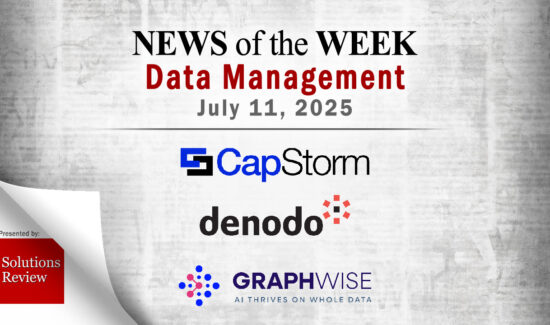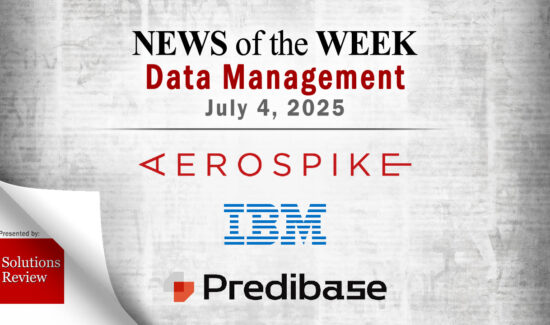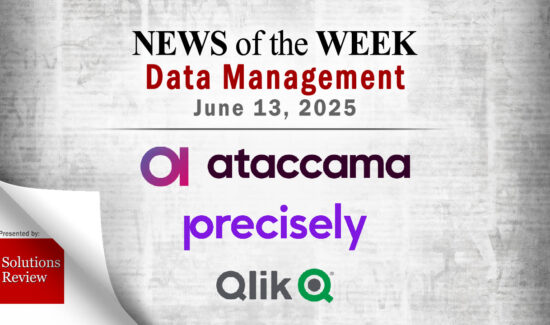Data Management News for the Week of September 6; Updates from Capgemini, Couchbase, Salesforce & More


Solutions Review Executive Editor Tim King curated this list of notable data management news for the week of September 6, 2024.
Keeping tabs on all the most relevant big data and data management news can be a time-consuming task. As a result, our editorial team aims to provide a summary of the top headlines from the last week, in this space. Solutions Review editors will curate vendor product news, mergers and acquisitions, venture capital funding, talent acquisition, and other noteworthy big data and data management news items.
Top Data Management News for the Week Ending September 6, 2024
Capgemini Acquires Syniti
Its market leading Syniti Knowledge Platform is a unified, cloud-based data management platform devised to break down the siloes that have traditionally defined the enterprise data management space, providing a collaborative platform that all business stakeholders can leverage to drive successful and repeatable business transformation initiatives.
Couchbase Launches Capella Columnar on AWS
Also generally available today is Couchbase Mobile with vector search, which makes it possible for customers to offer similarity and hybrid search in their applications on mobile and at the edge. With Capella Columnar and vector search capabilities in one cloud database platform, Couchbase helps customers reduce cost and simplify operations.
DataStax Updates its AI PaaS
Developers can easily import multiple PDF files of any size, chunk those files, and using DataStax Vectorize, they can generate the vector embeddings for improved query relevancy. This update adds support for more file types and streamlines data processing by bringing data preparation directly into the data loading process.
DiffusionData Releases Version 6.11
In previous releases the performance of updates in a clustered environment was significantly slower than that of a single server. With this release, asynchronous operations are applied to bring cluster performance comparable to a single server.
InfluxData Updated InfluxDB 3.0 with Performance and Storage Enhancements
The updates to InfluxDB 3.0 are aimed at easing development of applications based on time-series data, and include improved Ingest performance, real-time querying, and superior data compression through native object storage to power high-cardinality.
Neo4j Makes it Easier to Get Graph into Production
Neo4j’s announcement, made on the eve of its GraphSummit enterprise conference in New York, reinforces the company’s market position as the leading native graph database. It offers the most comprehensive and performant graph offering with vector search and search capabilities, the largest library of 65+ graph algorithms.
Salesforce Buys Own Company for $1.9 Billion
Own focuses on securing data across software applications. Since incorporating in 2015, it has received funding from Salesforce Ventures, BlackRock Inc. and Tiger Global. It changed its name from OwnBackup last October, according to Own’s website.
Revefi Unveils ‘World First’ Data Engineer
These “distinguished engineer” capabilities are now critical for organizations given the evolving role of the data engineer, which traditionally focused on data pipeline management but has expanded to emphasize cloud optimization, real-time data processing, scalable infrastructure and spend management.
Expert Insights Section
 Watch this space each week as our editors will share upcoming events, new thought leadership, and the best resources from Insight Jam, Solutions Review’s enterprise tech community for business software pros. The goal? To help you gain a forward-thinking analysis and remain on-trend through expert advice, best practices, predictions, and vendor-neutral software evaluation tools.
Watch this space each week as our editors will share upcoming events, new thought leadership, and the best resources from Insight Jam, Solutions Review’s enterprise tech community for business software pros. The goal? To help you gain a forward-thinking analysis and remain on-trend through expert advice, best practices, predictions, and vendor-neutral software evaluation tools.
Why Now is the Time to Move to Data-Centric AI By SR Expert Robert Eve
To help you understand and make a case for this transition, we have assembled three experts: infoVia‘s Michael Magalsky, Alation‘s David Sweenor, and DataOps.live‘s Guy Adams on Friday, September 6, 2024 at Noon ET, for our September Jam Session: Why Now Is the Time to Move to Data-Centric AI.
Expert Insights: How Long Does it Take to Implement a Data Governance Framework? By Nicola Askham
Designing your Data Governance initiative and beginning to realise any benefits can typically take between a year to 18 months. However, this should be considered a ballpark estimate – as your organization’s complexity and size are variables that could extend this timeframe.
For consideration in future data management news roundups, send your announcements to the editor: tking@solutionsreview.com.
Widget not in any sidebars



















